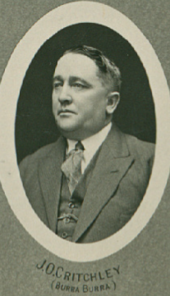Jack Critchley
Born at Callington in the Adelaide Hills of South Australia, and schooled in and around Petersburg (later Peterborough), Critchley completed an apprenticeship as a wheelwright, but was then sacked for forming a branch of his union.
He briefly served with the 10th Battalion on the Western Front in France and Belgium during World War I, but was repatriated as medically unfit, suffering from a neck condition.
He was readmitted to the party the following year, and worked as a vehicle registration clerk then managed clothing rations during World War II.
As a senator, Critchley advocated for returned servicemen, conservation, and railway reform, and was a fierce supporter of Labor's banking policies.
He promoted a national perspective on a range of issues, including railway reform, conservation, and the flying of the Australian flag, and was a strong opponent of state parochialism.
[5] He was allocated to the 16th reinforcements to the South Australia-raised 10th Battalion,[6] and after training embarked aboard the HMAT A9 Shropshire at Outer Harbor on 25 March.
[3] Upon returning from the war, Critchley gained employment with the South Australian Railways (SAR) at Peterborough (the renamed Petersburg)[12] as a carpenter, and married Alice Cave on 6 August 1919.
[23] Critchley was sensitive to the situation faced by workers during the Great Depression, deriding as "wretched" the call of the conservative opposition for "work for rations", and sought a tax on wages for employers and employees alike of three shillings.
[2] In 1931, splits within the ALP were inflamed over the Premiers' Plan – a deflationary and austere economic policy which sought to combat the effects of the Great Depression.
[26] He and the other members of the Parliamentary Labor Party were readmitted to the ALP after a "unity conference" in 1934, and Critchley became president of the electorate committee for the state seat of Goodwood, for which he ran unsuccessfully for preselection in 1938.
[30] His first speech in the Senate urged haste in settling returned servicemen on agricultural land, sought the implementation of soil and water conservation schemes, supported social services and child immigration, and lauded the Chifley government's plans to standardise the railways and improve the road transport system.
[33] On 1 July 1950, Critchley was appointed opposition whip in the Senate – responsible for managing business and maintaining party discipline,[34] a position he retained until September 1957.
[2] A keen advocate for returned service personnel,[35][36] Critchley was particularly concerned for the mental health needs of those suffering from what was then known as "war neurosis" – now known as combat stress reaction.
When these developments occurred interstate but had not yet happened in South Australia, he closely questioned the then Minister for Repatriation, Senator Walter Cooper.
[2] In 1956, Critchley and his South Australian Labor colleague Senator John Ryan advocated for a national serviceman, Private F. S. Luxton, who had been hospitalised for three months after the expiry of his training obligation period, to be compensated for the physical disabilities he had suffered.
[49] Long periods of absence from the Senate due to illness in his latter years resulted in his resignation as opposition whip in September 1957,[2] and he did not contest the 1958 Australian federal election.

